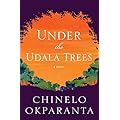
Under the Udala Trees is a sad, tender story of Ijeoma, a Nigerian girl who is 11 years old during the Nigerian civil war of the 1960s. Her family, part of the Igbo, represented by Biafra, is deeply religious and afraid of enslavement, hides in a bunker while being raided during the war’s violence. Then, her father refused to use the bunker during one of the Hausa’s raids, and he dies when their house is bombed. Ijeoma’s mother, Adaroa (daughter of all), believes that her husband’s death is akin to suicide. She becomes angry and, eventually, despondent. She wants to leave Ojoto and return to her people’s home in Aba. She sends Ijeoma to live with a grammar school teacher and his wife.
Ijeoama’s life at the grammar school teacher’s home in Nnewi changes profoundly. First of all, the teacher and his wife house her in a scant outdoor building and use her as a housegirl. Her status in life becomes decidedly lower-class, and she is treated almost subhuman. Ijeoma wonders why her mother doesn’t return for her, and her life is miserable until she meets Amina, a Hausa girl, on the way home from the market. She brings Amina back to the schoolteacher’s home, and they both live and serve the schoolteacher and his wife. Ijeoama and Amina become fast friends and eventually lovers. When the schoolteacher discovers the sexual nature of Amina and Ijeoma’s relationship, he considers their actions abominations according to the Bible and sends for Ijeoma’s mother.
Mama brings Ijeoama back to the home she has established in Aba and tries to convince her that her feelings and actions toward other women are genuinely abominations. Mama engages her daughter in Bible studies and creates so much inner turmoil for her. As the story progresses, Ijeoama sorts out her feelings for God, family, friends, and true sexual orientation. She makes interesting and sometimes surprising choices in a culture that abhors and condemns homosexuality. The language used by the author is beautiful, and the reader cannot help but sympathize with the soul-searching experienced by the protagonist.


